Archive for January, 2011

Home appliances to talk to owners
 (AFP): Mobile phones aren’t the only things getting smart. Home appliances are too. On display at the Consumer Electronics Show (CES) along with the latest smartphones and touchscreen tablet computers are ovens, dishwashers, washing machines, dryers, refrigerators and other products for the "connected" home. South Korea’s LG Electronics line of "Thinq" household appliances are connected to a home Wi-Fi network and can be controlled by a smartphone or a computer. LG refrigerators with touchscreen LCD displays let users keep tabs on where food items have been placed in the machine and when they expire."You can use a drag and drop system with icons or voice commands," said Patrick Steinkuhl, product insight manager
(AFP): Mobile phones aren’t the only things getting smart. Home appliances are too. On display at the Consumer Electronics Show (CES) along with the latest smartphones and touchscreen tablet computers are ovens, dishwashers, washing machines, dryers, refrigerators and other products for the "connected" home. South Korea’s LG Electronics line of "Thinq" household appliances are connected to a home Wi-Fi network and can be controlled by a smartphone or a computer. LG refrigerators with touchscreen LCD displays let users keep tabs on where food items have been placed in the machine and when they expire."You can use a drag and drop system with icons or voice commands," said Patrick Steinkuhl, product insight manager
"You can say things like ‘Ground beef top shelf.’ It has default expiration dates built in but if you want to change those you can," he said. "You’re in complete control."An owner of the LG refrigerator can access its contents while shopping via a smartphone and figure out, for example, whether they need to pick up another gallon of milk or orange juice.
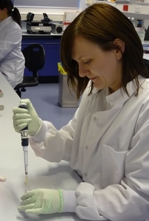
UK government to spend more on dementia research
 (UKPA) Experts in dementia are being urged to submit more bids for a slice of the Government’s £1 billion pot of research funding. Ministers have pledged to prioritise dementia research from March and are offering extra support to ensure proposals are high enough quality to pass independent scrutiny. Fewer research ideas are submitted for dementia than for some other diseases such as cancer, and ministers want to boost its profile. Expert advisory groups are working on identifying specific topics and improving the way proposals are submitted.
(UKPA) Experts in dementia are being urged to submit more bids for a slice of the Government’s £1 billion pot of research funding. Ministers have pledged to prioritise dementia research from March and are offering extra support to ensure proposals are high enough quality to pass independent scrutiny. Fewer research ideas are submitted for dementia than for some other diseases such as cancer, and ministers want to boost its profile. Expert advisory groups are working on identifying specific topics and improving the way proposals are submitted.
Care services minister Paul Burstow will invite proposals to the National Institute for Health Research for high quality studies on dementia care, cure, cause and prevention."As our population ages we need to better understand the disease if we are to counter its effects more successfully,” he said. “Research is the key to developing new treatments, transforming care and ultimately to finding a cure for this devastating disease.”
Go to article

Kid’s cop academy opens in West Bay
 (CNS): In an effort to strengthen the relationships between local police and young people in the district of West Bay the RCIPS has started a Junior Police Academy. The initiative which has been developed by West Bay District Commander Chief Inspector Frank Owens, his Neighbourhood policing team and staff from Sir John A. Cumber Primary School began on Thursday over 500 youngsters signed up for some crime busting action. The kids spent two days learning all about various departments of the RCIPS such as the Marine Unit, Traffic Department, K-9 Unit, Neighbourhood Policing, Scenes of Crime and the Air Operations. (Photos by Dennie Warren jr)
(CNS): In an effort to strengthen the relationships between local police and young people in the district of West Bay the RCIPS has started a Junior Police Academy. The initiative which has been developed by West Bay District Commander Chief Inspector Frank Owens, his Neighbourhood policing team and staff from Sir John A. Cumber Primary School began on Thursday over 500 youngsters signed up for some crime busting action. The kids spent two days learning all about various departments of the RCIPS such as the Marine Unit, Traffic Department, K-9 Unit, Neighbourhood Policing, Scenes of Crime and the Air Operations. (Photos by Dennie Warren jr)
Staff from each of the departments were on hand to work with the young would-be cops to build a greater understanding of what the police do – and why. The students were also trying out their marching and drill skills on the ‘parade square’ (the school basketball court) and groups took part in interactive presentations. Following the various sessions the new recruits passed through a ‘graduation ceremony’ to get their Junior Officer badges.
 Police said that in the months following the graduation ceremony a series of follow-up visits and presentations by officers will take place at the school.
Police said that in the months following the graduation ceremony a series of follow-up visits and presentations by officers will take place at the school.
“The Neighbourhood Officers at West Bay are already very well known at the school,” said Chief Inspector Frank Owens. “They have a good relationship with the students. However, this initiative provides us with an ideal opportunity to introduce them to many more aspects of policing. We’re sure that the youngsters will have a great time and that they will graduate feeling that they know much more about the RCIPS. Who knows, we may even see some of them apply to become police officers in the years to come.”
The Commissioner of Police, David Baines was also there to examine his new rank and file. “I applaud the staff of West Bay and Sir John A Cumber Primary School for their work on this initiative,” the top cop said. “It’s important for us, as a police service, to do all that we can to build relationships with our young people and instil in them a respect and an understanding of what we do.”
He said if it makes young people feel more confident approaching officers in the street, or learn more about teamwork, respect and responsibility it will be a huge success. “I’m sure that everyone involved – the school staff, my officers and the students – will have a great time at the Academy. Over the next few months the initiative will be rolled out to other schools and districts throughout the Islands,” he added.
 Joseph Wallace, the Principal of Sir John A. Cumber primary school said he was is delighted to be involved in the programme which provided the students with a wonderful opportunity to get a better understanding of the day to day functions of the police and the level of skills involved in preventing and solving crimes.
Joseph Wallace, the Principal of Sir John A. Cumber primary school said he was is delighted to be involved in the programme which provided the students with a wonderful opportunity to get a better understanding of the day to day functions of the police and the level of skills involved in preventing and solving crimes.
“It may also bean eye-opening experience for our older students who may be thinking about law enforcement as a possible choice of career,” he said. “The West Bay Police Department has already established an excellent and supportive working relationship with the school community and this ‘Academy’ is an outstanding opportunity to extend this,” the headmaster added.
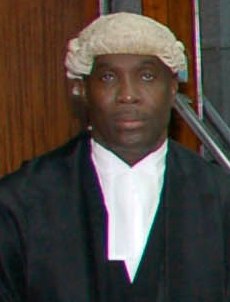
Legal preps for human rights writs
 (CNS): The Cayman Islands top lawyer has said the government’s legal department is expecting numerous applications to the courts alleging breaches of human rights once the country’s bill of rights comes into effect in November next year. Moving the motion for the opening on Wednesday of the Grand Court for the year 2011, Attorney General Sam Bulgin said that over the next two years government and civil servants had to prepare for the bill to limit the applications but it was inevitable that the courts would be called upon to adjudicate. The Attorney General’s Chambers will be the body responsible for defending government departments and personnel challenged under the bill of rights.
(CNS): The Cayman Islands top lawyer has said the government’s legal department is expecting numerous applications to the courts alleging breaches of human rights once the country’s bill of rights comes into effect in November next year. Moving the motion for the opening on Wednesday of the Grand Court for the year 2011, Attorney General Sam Bulgin said that over the next two years government and civil servants had to prepare for the bill to limit the applications but it was inevitable that the courts would be called upon to adjudicate. The Attorney General’s Chambers will be the body responsible for defending government departments and personnel challenged under the bill of rights.
Bulgin said, “Of the utmost significance over the next 22 or so months is to ensure that all institutions of government and personnel are ready for the bill of rights,” he said, “We expect that there may well be numerous applications to the courts alleging breaches of the guaranteed rights. It is therefore necessary for appropriate training all round to be undertaken to prepare ourselves so that such applications do not have to be made. Yet it is perhaps inevitable that the courts will be called upon to adjudicate on these rights and this carries with it the need for greater vigilance to ensure and support the independence of the judiciary and indeed the rule of law.”
Despite the fact that the bill of rights will not be in place until 2012, the AG noted that the people of Cayman still had legal access to protect their rights in Strasbourg. He said that during 2010 history was made when the European Court of Human Rights (ECHR) adjudicating for the first time on a case from the Cayman Islands that was tried in the Grand Court.
“The court heard an application from Kurt Fabian Ebanks in which he alleged that his right to a fair trial under Article 6 of the European Convention on Human Rights was breached and that he was able to access the European Court by way of the Right of Individual Petition, which was extended to Cayman on a permanent basis in 2006,” Bulgin said. “The court found, however, that there was no such breach of his rights and dismissed his application. Accordingly, even in the absence of a fully operational bill of rights, residents of these Islands do have access to the ECHR to seek redress.”
Following the implementation of the Cayman Islands Constitution at the end of 2009, a number of laws have needed to be changed and government, the AG said, was working hard to amend them to meet the requirements of country’s highest law. He pointed out that even where some relevant legislation has not yet been amended, it did not mean that things were unconstitutional.
“Section 4 of the actual Constitution Order quite properly anticipated that not all relevant amendments would be in place when the new Constitution came into effect – it therefore instructively provided that all relevant existing laws shall have effect after November 6th, 2009, as if they had been made pursuant to the 2009 Constitution and shall be read and construed with such modifications, etc, to bring them in conformity with the new Constitution. So there is no need for panic; we will get there,” he assured the audience at the official court ceremony.
He said that efforts were going well to put in place the building blocks and framework required to implement the constitution in full but he said that it was a work in progress. He pointed to key Institutions that he said were already in place and operational, such as the Constitutional Commission, the Human Rights Commission, the Judicial and Legal Services Commission, the National Security Council, the Advisory Committee on the Prerogative of Mercy and the Commission for Standards in Public Life.
However, he made no comment on the fact that the Standards inPublic Life Committee, which is charged with investigating the ethical and honest behaviour of politicians and civil servants, has not been functioning as it says it cannot fulfil its constitutional requirements without new legislation.

Bill makes Miller ‘sick’
 (CNS): The MLA for North Side was feeling ill when he spoke Wednesday on the proposed amendments to the Health Practice Law. However, it wasn’t just the flu that was making him feel bad but the content of the bill. Legal changes brought by the health minister were, Mark Scotland said, designed to address calls for change and to accommodate Dr Devi Shetty’s proposed health city. The bill enables government to designate medical tourism facilities and introduces a special register to allow health practitioners from India and other countries to work in Cayman. Miller, however, said that in all his 30 years in politics he had never seen a more disturbing bill as it had the potential to destroy everything that had been done by local professionals to improve Cayman’s heath care over the last 40 years.
(CNS): The MLA for North Side was feeling ill when he spoke Wednesday on the proposed amendments to the Health Practice Law. However, it wasn’t just the flu that was making him feel bad but the content of the bill. Legal changes brought by the health minister were, Mark Scotland said, designed to address calls for change and to accommodate Dr Devi Shetty’s proposed health city. The bill enables government to designate medical tourism facilities and introduces a special register to allow health practitioners from India and other countries to work in Cayman. Miller, however, said that in all his 30 years in politics he had never seen a more disturbing bill as it had the potential to destroy everything that had been done by local professionals to improve Cayman’s heath care over the last 40 years.
Introducing the bill, Scotland said it formed part of government’s agreement made with Dr Shetty’s group to recognize Indian health practitioners and allow them to practice here without their qualifications being gained in any of the current limit of seven countries. He added that, with medical tourism fast approaching $100 billion per year, it was a sound decision for government to pursue the industry which will bring jobs, revenue and business opportunities.
Scotland said in order to get the Shetty project, which has been given exclusivity for five years after it opens, the government has had to make certain concessions, and a key factor was to ensure medical practitioners from India and elsewhere would be able to register here. He said the country could not expect Dr Shetty to make such a major investment and not be able to recruit the staff.
The new special register will only allow those registered on it to practice at specific health facilities and not transfer to other medical units. “I know there is contention that the registry will be lowering standards but that is not the case,” Scotland said, adding that the medical professionals will still have to meet certain criteria and it was not in Shetty’s or anyone’s interest to employ substandard practitioners as everyone wants medical tourism to work.
Nor, he said, would it open the floodgates to health workers the world over and disenfranchise locals, as he said Shetty’s hospital would be encouraging more Caymanians into medicine and that immigration would still be in control.
Ezzard Miller, however, said it would not only lower standards but could undermine any possibility of making a bid to create medical tourism. In a two hour presentation Miller pointed out numerous problems with the law and that government, not a medical board, would be deciding what was designated a health facility and who could be on the special register without offering clear criteria.
He said the country’s high first world medical standards were being thrown out to satisfy the demands of one developer who had so far not even purchased one acre of land.
Warning of the dangers of developing a two tier system with differing quality of care, Miller said he was not the only one who believed this. Reading from a letter from the Cayman Islands Medical and Dental Society signed by its entire executive council, Miller said the profession was opposed and asked the minister to withdraw the bill.
In their letter the doctors query the need for a special registration and say the amendments will create this peculiar situation of two parallel health care systems. The doctors were also very concerned that the registration of health practitioners would be removed from the authority of legitimate professional bodies and placed in the hands of politicians, as well as the designation of a medical tourism facility. Warning of polarization of the medical profession and unfair competitive advantages, the doctors said they had not been properly consulted on the bill but offered to help government develop high quality patient oriented health care.
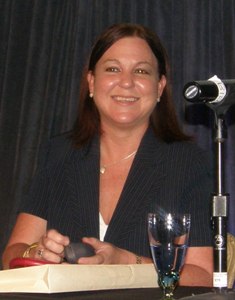
Gritty discussion lined up on Cayman’s ‘outlook’
 (CNS): Pay cuts, job losses, crime, education, leadership in government and immigration are some of the thorny subjects that will be up for discussion at this year’s Cayman Business Outlook conference. Organisers hope their panel discussion will be provocative enough to encourage some really meaningful dialogue among the community. “Things Tough! So Don’t Cut My Pay, Tax Me Less & Give Me More Free Services … And Do Something About Crime … Education … andJobs. And What About Those Expats?” is expected to generate a considerable amount of interest when it brings together a group of well known members of the community who, organizers hope, will be willing to express their views on the current “angst in the community”.
(CNS): Pay cuts, job losses, crime, education, leadership in government and immigration are some of the thorny subjects that will be up for discussion at this year’s Cayman Business Outlook conference. Organisers hope their panel discussion will be provocative enough to encourage some really meaningful dialogue among the community. “Things Tough! So Don’t Cut My Pay, Tax Me Less & Give Me More Free Services … And Do Something About Crime … Education … andJobs. And What About Those Expats?” is expected to generate a considerable amount of interest when it brings together a group of well known members of the community who, organizers hope, will be willing to express their views on the current “angst in the community”.
The panel is made up of Theo Bullmore, Tom McCallum, Roy Bodden, Burns Connolly, Sherri Bodden-Cowan (above at last year’s event) and Canover Watson (as the list currently stands) – and will be hosted by Austin Harris of Rooster 101. Panelists will receive questions that have been previously compiled by the organisers and the public is invited to send in their questions.
A popular part of the conference, the discussion will take place in the afternoon of 20 January at The Ritz-Carlton. Anwer Sunderji, Chairman of Fidelity Group (the company that is the driving force behind it) explained the provocative title.
“There is a good deal of angst in Cayman right now driven by populist anger and frustration, but said anonymously. We believe we need a more considered approach to issues facing the country right now via thoughtful and sensible discussion such as this,” he added.
Looking at how other countries have dealt with their own economic crises, Brett Hill, Fidelity Cayman CEO, said that while the UK government has implemented some serious cost cutting measures to counteract its growing debt problem, Cayman’s biggest market, the United States, has not, and this means the Cayman Islands should not rely on a recovery in the US any time soon to kick start its own economy.
“The US cannot count on getting itself out of its almost US$14 trillion debt problem any time soon. Radical cuts are going to have to be made there, as they have been in the UK, to deal with their record borrowing,” he commented. “Furthermore, the Cayman Islands is going to have to take a radical position and people are going to have to acceptthat they will have to make sacrifices in order for the jurisdiction to prosper again.”
The UK’s coalition government has, according to Sunderji, demonstrated leadership in these troubled times, implementing a series of drastic cuts in the public sector that, while they maybe painful to the UK public right now, should provide the country with a far stronger economy in the future.
“Simply continuing to borrow and ‘muddling through’ is not dealing with the real issue,” Sunderji said. “And likewise waiting for the US economy to pick up will be futile because the economic indicators point to a protracted slow recovery.”
Hill says the “sting in the tail” to the discussion will be the thrashing out of immigration issues. “If any other country in the world lost 15 to 20% of its people (as Cayman has) it would be catastrophic,” he said. “We hope that the discussion will encourage some sensible discourse about how Caymanians and expats can work together and that an understanding develops about the symbiotic relationship between the two.”
If you have any questions that you would like to hear aired in the panel discussion email: cbo@fidelitycayman.com
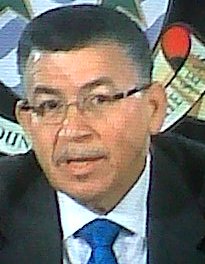
Mac hits back at critics over district councils
 (CNS): The country’s premier spoke to the nation again on Thursday evening to “dispel some of the fears, and correct some of the misinformation” that he said had surrounded the introduction of the district councils. He said the main point of contention was the manner in which they will be selected. Government did not think they should be elected, McKeeva Bush said in the address, but that members would be appointed by the Governor in Cabinet to include people nominated by the opposition, the ruling party, independent MLAs and the public. Bush hit out at the opposition, saying if they felt so strongly about electing council members they should have written it into the constitution and accused them of tearing down what the government was trying to build.
(CNS): The country’s premier spoke to the nation again on Thursday evening to “dispel some of the fears, and correct some of the misinformation” that he said had surrounded the introduction of the district councils. He said the main point of contention was the manner in which they will be selected. Government did not think they should be elected, McKeeva Bush said in the address, but that members would be appointed by the Governor in Cabinet to include people nominated by the opposition, the ruling party, independent MLAs and the public. Bush hit out at the opposition, saying if they felt so strongly about electing council members they should have written it into the constitution and accused them of tearing down what the government was trying to build.
The premier’s address was in response to the criticisms which were raised by the opposition and the independent MLA in the Legislative Assembly during the debate on the bill on Monday. The Advisory District Councils are provided for in the 2009 Cayman Islands Constitution.
“The constitution makes no requirement that the council members be elected and in my view for a good reason,” the premier said, adding that the councils are advisory bodies and will have no binding authority. “They are there to advise their district’s elected members of the Legislative Assembly on district matters.”
He denied that the councils would merely be a rubber stamp for government policy as there was nothing for them to rubber stamp since they are not there to approve or carry out policy but to advise their MLAs, and through their representatives advise the Cabinet.
Describing the councils as a linkbetween the elected legislators and the people of the district, he said they would not be sham entities and would not be appointed "to tell the government what it wants to hear" as has been charged. “Quite the contrary,” Bush claimed, as he said the law clearly sets out and guides the functions of these new bodies.
“These are meant to be real working bodies that will provide a valuable addition to our ability to assess the needs of people and communities, and respond with sensitivity and precision,” he told the people in an address broadcast on both CITN and Radio Cayman.
“We are therefore poised with the creation of the Advisory District Councils to begin a new era in our system of public governance,” he said.
According to the law, as many as ten members may be appointed to a council and the Cabinet will select and appoint four officers. Up to six other members may be appointed. Of these regular members, at least two must be recommended by the leader of the opposition.
“This means that it is possible for the opposition to have more than two members on a council,” Bush stated. “The opposition well knows, and the press ought to know, that the health of a liberal democracy may be measured in direct proportion to the exercise by persons of their rights as citizens. The Advisory District Councils, as an instrument of public governance, will be as well-balanced as people make them. We remain answerable to the electorate. If they don’t like the way we appoint the councils, what we throw on them will boomerang on us,” he added.
He said government intended representation on the councils to be fair, open and balanced. He said where there is no ruling party members in a district, such as East End and North Side, where he said “the MLA is supposedly declared independent”, the law stipulates that the ruling party would in such cases be limited to no more than three nominations to the council. “Clearly the point is to give the member a recognisably strong hand,” Bush stated, adding that would not be the approach of a government whose intent was to control the councils in the "dictatorial" manner that has been charged, in the inflammatory language of the bill’s opposers.
“Critics of the bill say that, by appointing the council members, the government will load the councils with cronies who will tell the government what it wants to hear. Now that would be foolish. How could a government expect to be re-elected if it doesn’t listen to what the people are telling the district council?” he asked rhetorically.
He said that while people were saying the UDP government was creating an advantage for itself by having the members appointed, he had been in the political arena long enough to know that in the Cayman Islands no one party, team or person stays in power forever.
“At some point in the future, the UDP will sit as the loyal opposition,” he said. “So why would we create a situation that gives an advantage to some future government that we might have to sit in opposition to in the Legislative Assembly? That would not only be a failure of good governance, it would indicate a collapse of common sense.”
Bush also criticised the amendment offered by the North Side representative, Ezzard Miller, as he said it sought to exclude all but registered voters from either voting or holding office on the councils.
“The effect of this would be to exclude from the councils many persons with a wealth of skills and experience potentially of value to their communities. In contrast to this, the councils, as proposed in the bill, would be as inclusive as possible, also giving civil servants an opportunity to contribute to public efforts in a more open forum.”
The Advisory District Councils, he said, would offer a different quality of involvement from anything seen before and said how they operated would be the important thing.
“Don’t believe the crude political rhetoric that makes the councils out to be puppets of the government. The Advisory District Councils will be as good as you want them to be, as good as you make them – as good as your questions, your opinions, your suggestions,” the premier declared.
Year’s 1st fishing contest offers 10K for record wahoo
(CNS): The 3rd annual Barcadere Classic will kick off the 2011 fishing year in Cayman on 22 January at the historic George TownBarcadere Marina. The tournament was originally the “Naul Bodden Wahoo Classic” named for Bodden’s record breaking 105 lbs 10 oz Wahoo caught in February 1987. The record stood until June 2007 when Elvet Conolly caught one weighing 146 lbs 2 oz normally a slow time for catching Wahoo making it the remarkable and unchallenged record to beat at this year’s contest. Although Yellowfin Tuna, Dolphin and new for this year Marlin have been added as eligible species to sweeten the pot the Wahoo continues to be the emphasis for the tournament with a $10K prize for a record breaker.
The prize on offer for a none record breaking first place is CI$5000, CI$3000 for second and CI$1000 for third. For Yellowfin Tuna 1st is CI$2000, 2nd CI$1000, and for Dolphin 1st CI$2000 and 2nd CI$1000. There are also prizes for the heaviest fish caught by a Junior Angler, the heaviest fish caught by a Lady angler and a prize for the most marlin releases.
The targets to beat from the 2010 tournament are: Heaviest Dolphin (26.8 lbs) caught byLincoln Hurlston aboard Bare Assets, Heaviest Yellowfin Tuna (67 lbs) was caught by Nick Jones aboard Pura Vida , Heaviest Wahoo (54.3 lbs) was caught by Al Parsons aboard Strike Force, Curtis Hester was awarded the Junior Angler prize for catching a 42.8 pound Wahoo aboard Yorkshire Rose.
Registration – Thursday January 20th at Guy Harvey’s Grill from 7pm-9pm
Fishing Days – Saturday January 22nd & Sunday January 23rd from 6am – 4:30pm
Weigh In – at The Barcadere Marina from 4:30pm – 6pm (Snacks provided by Cracked Conch & cash bar by Barnes Bartender Service)
Catboat Rides – provided by the Catboat Club at The Barcadere on Sunday January 23rd from 3pm
Awards Presentation – Monday January 24th at The Cracked Conch/Macabuca at 7pm
Entry Fee – CI$300/boat up to 4 anglers – each additional angler is CI$100
There will be a raffle draw and all proceeds will be donated to The Cayman Islands Diabetes Charitable Trust & Guy Harvey Ocean Foundation to promote responsible sport fishing the causes supported by this year’s tournament.

Lionfish target of Cayman’s culinary month
 (CNS): The pesky lionfish which has become for too common a sight on Cayman’s reefs has a target on its back this month as various groups and restaurants involved in the culinary events taking place on Grand Cayman in January seek to put the fish on the menu. Divers are being enlisted to help bag the fish for both environmental reasons and to go in the pot for various cookouts. Although an attractive looking fish Pterois volitans is a dangerous invasive species. Native to the tropical regions of the Pacific Ocean its arrival in the Caribbean seems to be down to an accidental release from a home aquarium in Florida. Lionfish have no natural predators and are outcompeting native species, in particular the Nassau grouper.
(CNS): The pesky lionfish which has become for too common a sight on Cayman’s reefs has a target on its back this month as various groups and restaurants involved in the culinary events taking place on Grand Cayman in January seek to put the fish on the menu. Divers are being enlisted to help bag the fish for both environmental reasons and to go in the pot for various cookouts. Although an attractive looking fish Pterois volitans is a dangerous invasive species. Native to the tropical regions of the Pacific Ocean its arrival in the Caribbean seems to be down to an accidental release from a home aquarium in Florida. Lionfish have no natural predators and are outcompeting native species, in particular the Nassau grouper.
The Cobalt Coast lionfish hunt and cookout combines an educational briefing about lionfish, a one-tank dive to catch some and a cooking demonstration as well as a tasting washed down with a glass of wine.
Local dive shop Ambassador Divers with the Department of the Environment will also be culling lionfish in Cayman’s waters which will be cooked and served at Taste of Cayman at Michael’s Genuine Food & Drinks booth. The third in their lionfish culling tournaments, Ambassador Divers hopes to encourage more than 125 divers to take part in this 3-day culling extravaganza. In all, about 300 pounds of lionfish are needed to provide the amount of food needed by Chef Tom at Michael’s Genuine for their booth at Taste of Cayman.
Divers in Caymans waters have been integrally involved in helping to cull, or remove, lionfish from the reefs. As a result there has been an increase in the number of fishing tournaments that target the lionfish as well as many local restaurants offering various dishes on their menus–both for special occasions and as a regular offering. L lionfish ceviche, lionfish fingers, teriyaki lionfish, Greek style lionfish are just some of the dishes that are putting the fish to good use.
While the fish were once prized for their beauty as an aquarium fish they do have food value as well. Despite having dangerous poisonous spines fish is safe to eat as the venom is only in the dorsal spines–not in the flesh. All the danger comes into play in the catching and cleaning of the fish. Even after the fish has died, the venom in the spines remains active for up to one hour.
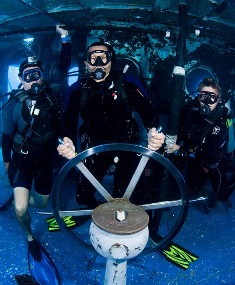
MLA takes family on early Kittiwake dive
 (CNS): While there may be times when West Bay MLA Cline Glidden’s family curse him for choosing politics as a career because of the notorious demands of public life, they were unlikely to be doing it last Thursday when the privileges of office paid off for them. The back-bencher, his 13-year-old son Cline Jr and wife Gloria, who all recently received their dive certification, were among the first people to dive the Kittiwake. While the site was closed to ‘Joe diver’, the Gliddens were able to join the visiting film crews and dive the wreck the day after the historic sinking. (Photo by Courtney Platt)
(CNS): While there may be times when West Bay MLA Cline Glidden’s family curse him for choosing politics as a career because of the notorious demands of public life, they were unlikely to be doing it last Thursday when the privileges of office paid off for them. The back-bencher, his 13-year-old son Cline Jr and wife Gloria, who all recently received their dive certification, were among the first people to dive the Kittiwake. While the site was closed to ‘Joe diver’, the Gliddens were able to join the visiting film crews and dive the wreck the day after the historic sinking. (Photo by Courtney Platt)
Diving with crews from the Discovery Channel and National Geographic, who were chronicling the story of the Kittiwake’s scuttling in Grand Cayman’s waters, Glidden said it was one of the most thrilling experiences he has had diving since he was certified. Both film crews have followed the progress of the Kittiwake and will feature its remarkable story as the Cayman Islands’ newest dive site in upcoming documentaries.
“Having been involved in the Kittiwake project over the past few years and, more recently, participating in the topside tour while it was anchored off the West Bay Public Beach and watching the fascinating sinking process, I was quite eager to get underwater and explore this wreck that so many divers and snorkelers will visit the Cayman Islands to see,” the backbench MLA said.
Glidden had also officiated in the vessel’s dedication ceremony prior to the sinking event .
“The Kittiwake is an incredible underwater attraction – one that I encourage all Caymanians and residents to experience, whether by diving or snorkeling. Not only is this a pleasurable experience, but I am sure divers and snorkelers will come to appreciate its importance to our dive industry and tourism in general,” Glidden added.
The Kittiwake permanently and officially opened to the public on Wednesday 12 January and operators licensed by the Cayman Islands Tourism Association (CITA) are now running diving and snorkeling tours. For more information on how to dive or snorkel the wreck visit www.kittiwakecayman.com.